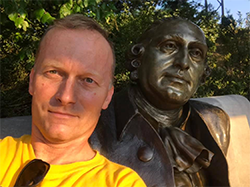Peter Bizon (DNP ’20) signed up to volunteer at the Loudoun County Health Department as soon as its call center opened to address residents’ questions about COVID-19 in March. Three weeks into his tenure, Bizon was appointed supervisor of fielding inbound calls—affectionately known as “playing defense.” The defensive team is completely staffed by volunteers to meet the high demand for information. The outbound call team is staffed by nurse practitioners (NPs) focused on offense – making calls about “higher-than-low probability” of COVID-19 exposures, including contact tracing those potentially exposed to COVID-19.
During any pandemic, people are seeking factual information and can be uncertain or afraid. Bizon works five hours shifts every weekday answering an average of ten calls per shift with questions on topics ranging from housing assistance to quarantine guidelines. “There is a lot more going on in a call center than simply answering phone calls,” he explains, “we have to think outside the box on a daily basis so we can provide the best outcomes for the most callers. Some people simply call to vent their frustrations.”

"Stay motivated," says soon-to-graduate DNP student Peter Bizon.
“Stay motivated,” advises Bizon, and he seems to heed his own advice. He was recently accepted to Uniformed Services University of Health Sciences (USUHS) starting in the summer for their Global Health Engagement program (GHE).
He encourages all qualified individuals to join the Medical Reserve Corps in their counties if they have not already. Virginia is looking for an additional 30,000 volunteers—and once the COVID-19 vaccine is available, Medical Reserve Corps will be in unprecedented demand.
The Doctor of Nursing Practice (DNP) program at GMU requires at least 400 hours of DNP Essentials, which includes volunteering in a Nurse Practitioner role. Bizon reports that “what students learn in DNP Essentials is essential even after graduation.”
